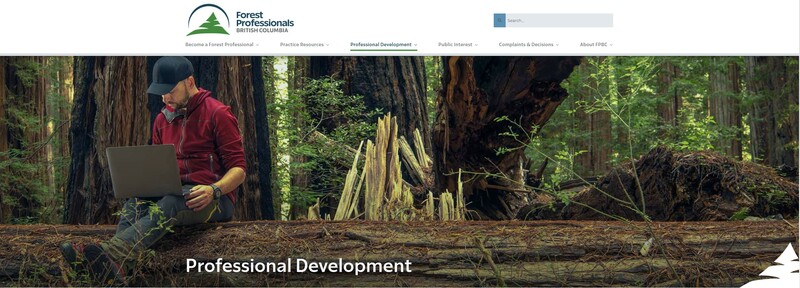e-Learning Ecologies MOOC’s Updates
Ubiquitous Learning: Mobile Learning - Application to Continuous Professional Development
Mobile learning is a ubiquitous learning concept or method that allows learners to access content wherever and whenever the need arises using mobile devices (i.e., cell or satellite phones, laptops, tablets etc.)[1]. This method of learning has significantly enabled and enhanced continuing professional development among professional foresters in British Columbia, Canada, who often practice in remote areas across a vast forested landscape.
Source: https://geology.com/canada/british-columbia.shtml
In British Columbia, forest practitioners are required by law to maintain professional competency as set out by the regulatory body, Forest Professionals British Columbia (FPBC), through its continuing professional development program.[2]
Source: https://www.fpbc.ca/professional-development/
Prior to the availability of mobile devices and web access, learning was largely constrained to classroom learning, field seminars, conferences and peer to peer "one the job" engagements. As technology has evolved, so too has the suite of learning opportunities. In addition to classical classroom learning and peer to peer learning on the job, learning opportunities can be accessed through a variety of methods including:
- webinars (live and recorded)
- e-modules
- conferences with virtual components
- social media
- collaborative platforms.
These advances have significantly enhanced the learning environment by:
- Expanding access to more practitioners - Learning is now available to practioners who are deployed on field assignments or located in remote communities where traditional learning is not available, or travel is cost prohibitive.
- Enriching the scope, quality, and timeliness of information - Compared to traditional classroom methods using textbooks, e-learning materials are much easier to create, update and broadcast to learners through the web.
- Supporting collaborate learning - Practitioners can readily develop and share knowledge with colleagues across the province and in jurisdictions around the world.
In important, evolving areas of forest practice such as climate change mitigation, continuous professional development opportunities are essential. Rapidly developing technologies need to be paid attention to in order to ensure optimal use and affordances of mobile learning.




رائع